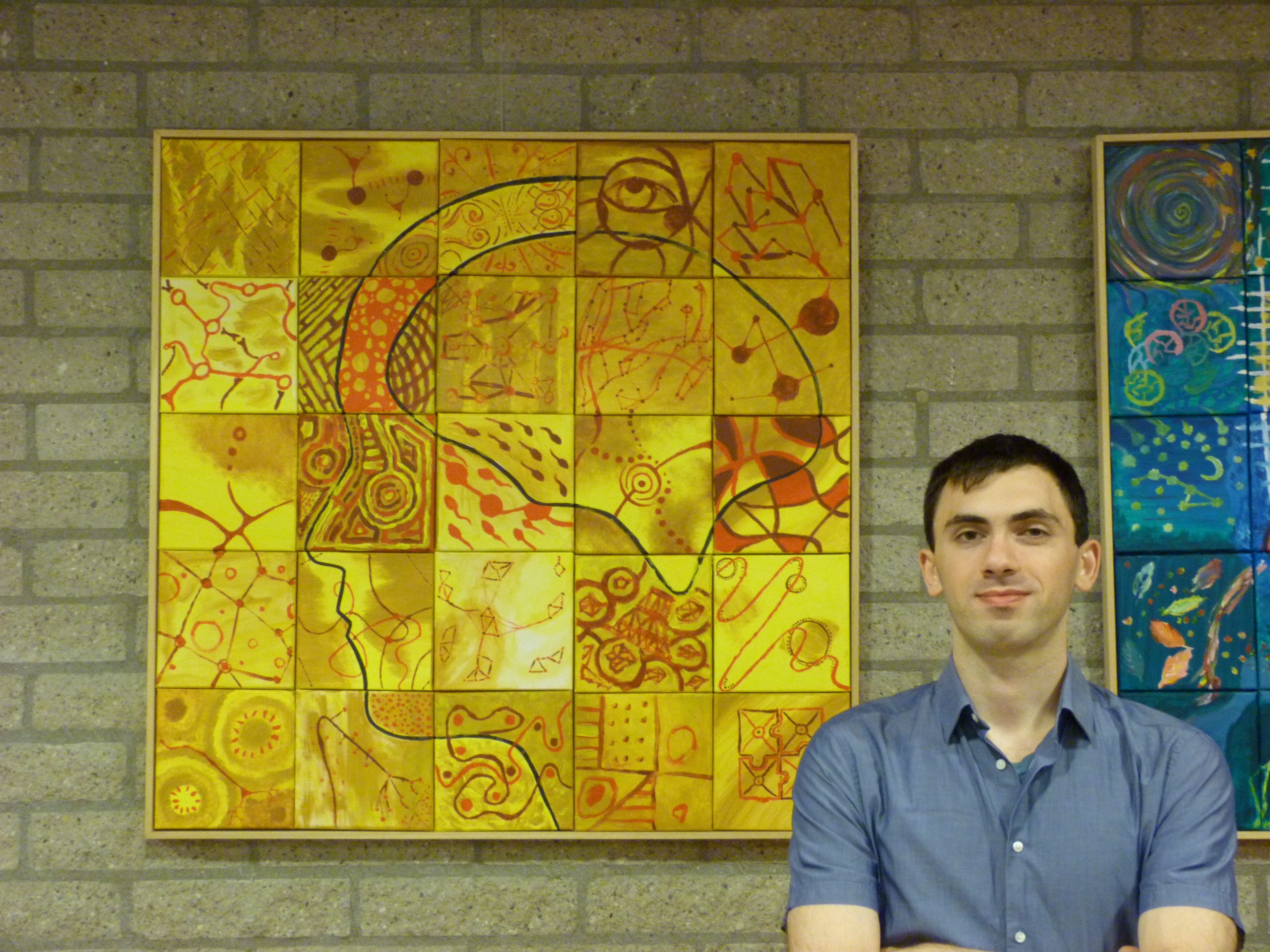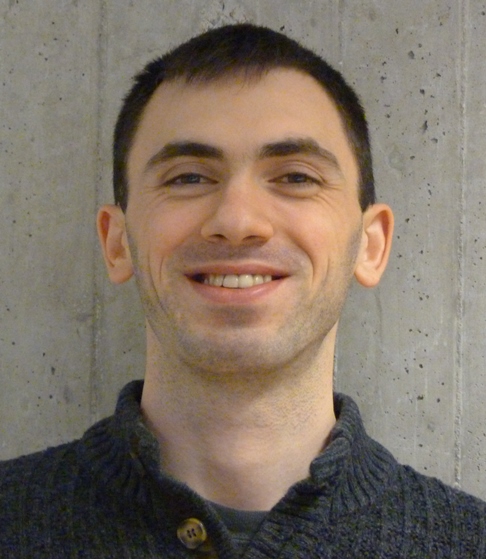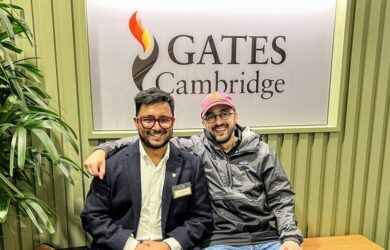
Levan Bokeria is researching how memories are formed and what can make the process of creating lasting memories more effective.
Neuroscience offers not only unprecedented tools to answer the deepest philosophical puzzles about cognition, but also an opportunity to use the discovered mechanistic understanding of the brain to design effective strategies for improving human abilities.
Levan Bokeria
Levan Bokeria has been researching how memories are formed and consolidated, in essence how they move from our short to our long term memory.
He says: “I am looking at what is going on in the brain and what conditions make the process more effective. This could, in the long term, help with understanding certain neurodegenerative diseases.”
Levan [2018] will continue this research at Cambridge in the autumn, when he starts his PhD in Biological Science at the MRC Cognition and Brain Sciences Unit and becomes the first Gates Cambridge Scholar from Georgia.
Currently his research at the Memory Dynamics laboratory at the Donders Institute in the Netherlands focuses on mice, but at Cambridge he will work with humans in Professor Richard Henson’s laboratory.
He says: “With the help of the amazing research community at Cambridge, I aim to uncover the inner workings of the human brain as it learns and remembers, in an effort to contribute to the development of science-based, effective strategies for improving knowledge acquisition and idea generation. I hope that such insights can be used to improve human learning in healthy adults as well as those with neurodegenerative diseases.”
He adds: "It is my hope that with further basic science research we can design better learning and memorisation techniques. This is currently a challenge because we have only scraped the surface of understanding the brain and we do not have a solid enough foundation to base practical recommendations on. However, once we do understand the underlying neural processes I am confident that this will revolutionise the field of learning. An analogy I like to use is between a car and the brain. Compare two car mechanics: one who has a vague idea about the hardware and software of the car and how various functional systems interact with each other, while the other one has an intricate, complete understanding of the underlying mechanisms and structures. Imagine just how much better the second mechanic will be at fixing any issue with a car or designing improvements for it.
"Our contemporary cognitive neuroscience is just like the first mechanic. We have learned a lot about the brain, but still lack integrative rigorous understanding of its functioning. But if we manage to fully characterize the anatomical and functional architecture of the brain, we will be as good at treating and improving our cognition as the second mechanic would be at fixing a car."
Georgia
Levan was born in Tbilisi, Georgia. He has a large extended family, including two stepsisters and a sister. His mother is Associated Professor and Vice Dean of the Business School at Ilia State University and his father was a civil rights activist in the 1990s and early 2000s. Since the Rose Revolution he has been exclusively involved in politics and is currently an opposition MP and one of the leaders of the political party European Georgia.
Levan grew up in the turbulent Georgian politics of the 1990s and 2000s in the aftermath of the fall of the Soviet Union. In 2003 the Rose Revolution took place which culminated in the ouster of President Eduard Shevardnadze, marking the end of the Soviet era of leadership in the country. The year before Levan left school the short-lived Russo-Georgian War erupted.
Levan transferred to a school that specialised in physics and maths when he was 12 and there he took part in local and international Olympiads in maths and physics, travelling to Kiev in 2006 and to Germany in 2008 for an event for young computer scientists. Levan also took part in competitions organised by the local NATO office and wrote short articles for NATO publications, but says he was never involved in any political movement.
When he left school Levan’s parents were keen for him to study abroad to get a broader international perspective and a better quality education. At first Levan wanted to stay in Georgia with his friends amid the political instability in the region.
He applied, however, to some US universities and was accepted by George Mason University in Virginia. Levan initially majored in sociology and minored in economics, a subject his father had recommended. He had thought economics was a dry subject focused on money, but soon realised it could be used to question what is valued, how the world works and how to build a better society.
Levan spent seven years in the US and says the experiences represented “a huge transformative change” in his life. “I learnt a lot about tolerance and diversity. Everyone thinks their country is the best, but there is much you can learn from others. Several beliefs I had were broken down,” he says.
Two years into his degree he switched universities after becoming interested in bioethics and philosophy. He moved to the University of Rochester in upstate New York where he was president of the university’s philosophy club and discovered a fascination for neuroscience. He ended up majoring in philosophy and brain and cognitive science with a minor in economics. In addition he won a place on the Take Five Scholars programme which meant he could take another subject for half a year with all fees waived. He chose political science and focused on the recent history of Eastern Europe after the fall of the Soviet Union. As part of this programme, he participated in a summer school at the Jagiellonian University in Krakow, Poland.
“All the subjects connect in interesting ways. Psychology and economics connect in behavioural economics. Political science is about human behaviour and cognitive neuroscience can be used to answer philosophical questions,” says Levan.
Research
After graduating in 2014, he was intending to return to Georgia, but was offered a research assistant post in two laboratories at Georgetown University with leading neuroscientists. At one of the laboratories, the Laboratory for Computational Cognitive Neuroscience, Levan worked on a modelling project to understand data related to human performance in a particular task. He was also laboratory manager. At the second laboratory, the Centre for Functional and Molecular Imaging, Levan was working on a research project on perceptual imagery and was trained as an MRI operator. “It gave me a good perspective on what was going on in the field,” he says. Levan also developed an interest in artificial intelligence and co-founded Georgetown’s artificial intelligence club. He also participated in various science outreach initiatives, including brain awareness weeks, lectures given to local school children, science fairs and other events.
After two years he was keen to return to Europe and applied to do a master’s at the Donders Institute in the Netherlands, a world famous centre for cognitive neuroscience. There he has taken part in various international conferences and, in addition to his master's research, has worked part-time in the Predictive Brain laboratory to gain more research experience.
He is looking forward to continuing his research in Cambridge, having visited the UK in the past for summer schools.
He says: “Neuroscience offers not only unprecedented tools to answer the deepest philosophical puzzles about cognition, but also an opportunity to use the discovered mechanistic understanding of the brain to design effective strategies for improving human abilities. I have realised that at the heart of every scientific and intellectual advancement, at the foundation of human progress, lies the human ability to learn, create and solve problems, enabled by our fascinatingly complex underlying neuro-computational processes.”

Levan Bokeria
- Alumni
- Georgia
- 2018 PhD Biological Science at the MRC Cognition and Brain Sciences Unit
- Hughes Hall
I was born and raised in Tbilisi, capital of Georgia. I completed my Bachelors studies at the University of Rochester in the USA, exploring a diverse set of disciplines including philosophy, neuroscience, economics, and political science. I rapidly developed a deep interest in brain sciences, fueled by my philosophical fascination about the human mind. I continued my scientific training as a research assistant at Georgetown University, followed by a Research Master’s studies at the Donders Institute in the Netherlands. I gradually realized that Neuroscience offers not only unprecedented tools to answer deepest philosophical puzzles about cognition, but also an opportunity to use the discovered mechanistic understanding of the brain to design effective strategies for improving human abilities. I realized that at the heart of every scientific and intellectual advancement, at the foundation of human progress lies the human ability to learn, create, and solve problems, enabled by the fascinatingly complex underlying neuro-computational processes. With the help of the amazing research community at Cambridge, I aim to uncover the inner workings of the human brain as it learns and remembers, in an effort to contribute to the development of science-based, effective strategies for improving knowledge acquisition and idea generation. I hope that such insights can be used to improve human learning in healthy adults as well as those with neurodegenerative diseases.
Previous Education
University of Rochester
Georgetown University
Radboud University Nijmegen












